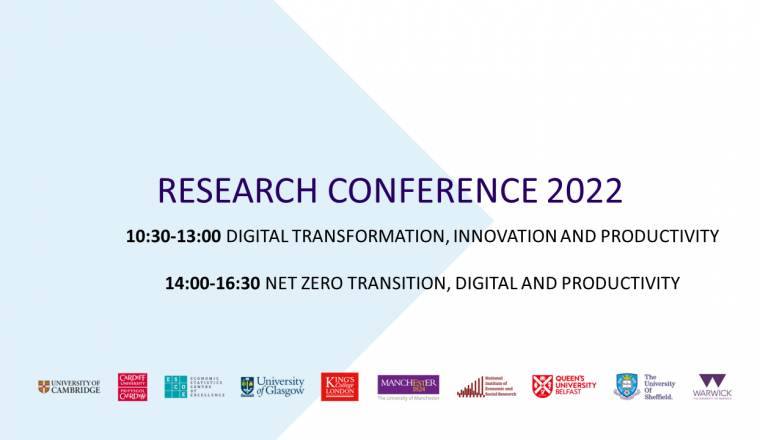Will We Get a Productive Budget?
BART VAN ARK
As the UK awaits the Chancellor’s upcoming Budget, the question on everyone’s mind is whether this fiscal event will raise taxes, cut spending, or both? Yet the Budget is far more than an exercise in balancing tax and spend. It is a pivotal moment to shape the UK’s growth agenda and, crucially, to move the needle on productivity. What we need now is a long-term focus, stability, and confidence to invest in the true drivers of productivity.
Why the Budget Matters for Productivity
The government has repeatedly pledged to raise productivity, and strategies have been outlined. Now is the moment to shift from promises to delivery. That is easier said than done. Short-term measures, such as accelerating AI adoption in government and supporting businesses to do so as well, could help offset the slowdown in labour productivity.
At the same time, the Budget must address deeper structural challenges and set a clear course for the future. The CBI’s recent submission to the Treasury, for example, highlights four priorities that don’t necessarily require more spending but do demand better coordination across policy areas. First, the UK faces persistent bottlenecks in planning and construction. Removing barriers in the planning system and accelerating infrastructure projects is critical. Second, improving the skills system and bringing inactive workers back into the labour market are key to raising productive output. Third, a national tech adoption strategy could help every business access transformative tools. And finally high energy prices are squeezing business investment. Action here would boost competitiveness relative to international peers.
Beyond these priorities, the Budget must provide predictability. Businesses invest when they trust the policy environment. Fiscal volatility and constant speculation undermine that confidence. A credible long-term growth plan anchored in the Budget can set the tone. The Industrial Strategy’s 10-year horizon is promising, but its credibility depends on execution. Ambition matters, but right now delivery matters more. If delivery falters, the growth narrative collapses.
How Productivity is Shaping the Budget
This year, productivity forecasts are under the spotlight. The Office for Budget Responsibility (OBR) is expected to downgrade its projections for productivity. The forecast of 1.3% trend productivity growth looks unrealistic given the recent trend of near zero. A correction is overdue, but it will make the Chancellor’s job harder, shrinking fiscal headroom by billions. In fact, according to the National Institute of Economic and Social Research (NIESR) every 0.1 percentage point drop in trend productivity growth adds up to £10 billion to the deficit.
While much depends on it, forecasting productivity is notoriously difficult and the outlook is highly uncertain. For example, AI and other technologies could transform potential output in the long run, and there could be positive impacts even within five years. Policymakers must plan for this ambiguity regarding public investment decisions. In any case, focusing policies more directly on productivity improvements across the economy is now more urgent than ever.
Spend Wisely
Investment is essential for productivity, but quantity alone isn’t enough. Public spending must be smarter and better targeted. That also means providing the right kind of public investment to crowd in private investment.
We’ll need to better prioritise by focusing on growth-enhancing areas such as housing, transport, digital and energy infrastructure, and targeting regions where investment can unlock private sector growth. Currently, only about a third of public capital expenditure goes to these areas. Removing planning bottlenecks and leveraging public-private partnerships can accelerate delivery. For example, practical steps like hiring more local planners and exploring AI to streamline approvals can help.
Public-private partnerships can also help crowd in private investment, though benefits take time to materialise.
Tax Smartly
With limited fiscal space, tax rises seem inevitable. But they must be designed to avoid damaging investment incentives. Business taxes are already at a 25-year high, and recent hikes have dented confidence. Reforming property taxes and simplifying the tax system should be top priorities.
If revenue must rise, income tax is the least harmful option for growth compared to business taxes or VAT. Yet politics complicates this: manifesto commitments and public resistance make such tough choices harder, opening up the likelihood of some less business or investment friendly, and more hastily cooked up, alternatives.
A ‘smorgasbord’ of smaller tax rises to close the fiscal gap risks undermining their intended purpose of boosting growth and productivity. Transparency and packaging reforms – such as a comprehensive approach to road and vehicle taxation – can help ease short-term pain.
A Credible Growth Strategy
The upcoming budget is more than a fiscal exercise. It’s a test of the UK’s commitment to long-term productivity growth. Success depends on three principles. Decisions must be viewed through a growth lens, even if they’re politically tough in the short term. Investment needs to be delivered in a smarter way. Infrastructure, skills, and technology diffusion need to be prioritised and barriers to execution must be removed. And finally, we need a stable and transparent set of policies which reduce uncertainty and build business confidence to crowd in private investment.
The stakes are high, not just for this budget, but for the UK’s economic future.
This blog is based on the latest episode of Productivity Puzzles, where Bart van Ark spoke with Louise Hellem (CBI), Tera Allas (Alliance Manchester Business School), and Stephen Millard (NIESR) to unpack the complex relationship between the budget and productivity and why this year’s decisions matter more than ever. To find out more, listen to the entire podcast, Will We Get a Productive Budget?



